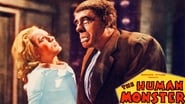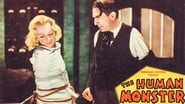Senteur
As somebody who had not heard any of this before, it became a curious phenomenon to sit and watch a film and slowly have the realities begin to click into place.
Rio Hayward
All of these films share one commonality, that being a kind of emotional center that humanizes a cast of monsters.
Roman Sampson
One of the most extraordinary films you will see this year. Take that as you want.
Aspen Orson
There is definitely an excellent idea hidden in the background of the film. Unfortunately, it's difficult to find it.
Nigel P
Based on the Edgar Wallace book, 'Dark Eyes of London' features the mighty Bela Lugosi, incongruously surrounded by very British docklands, slums, murky water, and a vast home for the blind.Horror is subjective: what frightens one person may bore another. For some reason, this film fills me with dread. The style of acting, the grainy images and muffled sound only add to this. The atmosphere is one of cruelty, brutality and the most vulnerable in society are subject to these atrocities. The seediness of their surroundings, the extravagance of Bela's performance – every murky thing about this picture gets to me in a way far more polished efforts somehow do not. And it's not even a pure horror – more a thriller caper, with grotesque elements.Anyway, Bela plays a dual role – one, bewigged, wearing black glasses and softly (and very convincingly) dubbed by another (English) actor as blind Dearborn, head of a converted warehouse that is now a home for the blind. He also plays Dr. Orloff, who commits a series of murders for insurance purposes. Surrounded by more mannered, less memorable performers, Bela 'does his thing': some would call it ham, others might enjoy his theatrical playing. I'm definitely in the latter camp – once again, his heightened acting compared to the genteel under-playing of his co-stars is very effective. His portrayal of blind Dearborn is brilliant, his whole deportment is changed, his movements slow and uncertain. This become instantly obvious when Dearborn reveals his true identity, the contrast in his performance is effortless and impressive. The blind are portrayed as tragic, shunned, kindly characters. None more so than monstrous Jake, who is also given the full horror make-up. Played by Wilfred Walter, he shares with Bela an exaggerated menace. The services held in Dearborn Home are eerie sights, with the residents sitting in cheerless silence as a kindly, aged voice escapes Bela – which in itself is a creepy oddity.The character of resident Dumb Lou (Arthur E. Owen) suffers the brunt of Orloff's cruelty. Lou is blind and unable to speak. When he discovers too much about Dearborn's duplicity, Orloff robs him of his hearing too. Using (now) archaic Frankenstein-esque electronic equipment, the helpless little man is strapped down, taunted by Orloff, and has his hearing burnt out, the only reaction being the agitated twitching of his hands. The act is largely unseen, but we hear a distant scream. When we return to the scene, Lou's hands have stopped twitching. It is a horrible moment, as is Orloff's later gleeful drowning of the poor wretch.A smoky morgue, a tearful heroine, mouldy walls, Lugosi's stare, drownings … Director Walter Summers ensures every setting is as downbeat as possible, adding layer upon layer of leaden atmosphere upon an already sombre palette. And I think that's what grabs me about this – the sparingly used horrific incidents are merely icing on this absorbingly bleak cake. An absorbingly bleak cake? I told you this film had an effect on me (the light comic ending almost seems to have been spliced in from another picture).Considering it was the British ban on horror films that helped put the kibosh on many such films stateside a few years before, this is an audaciously (hypocritically?) gruesome thing. The briefly glimpsed images of corpses pulled out of the Thames are surprisingly graphic. Orloff's fate, at the hands of a furious, betrayed Jake is disappointingly brief, and features Bela up to his neck in gulping muddy sludge, and brings to an end an exceptional film. I almost wish the sound and image quality could be cleaned up like the Universal pictures, but such an operation would somehow rob 'Dark Eyes of London' of much of its rich, shadowy ambiance.
mark.waltz
Poor audio and cheap production values make this crime melodrama barely watchable, saved only by the action-packed ending and some horrific moments of suspense. It surrounds an insurance scam set inside a school for the blind. Bela Lugosi is the mastermind behind the scam, and it isn't made clear whether "The Human Monster" or "The Dark Eyes of London" (its original title which I prefer) are Lugosi's or the blind giant (Wilfred Walter) who utilizes other senses to perform Lugosi's nefarious orders. This seems like something that Tod Slaughter would have done, fitting considering his low-budget British melodramas like "The Demon Barber of Fleet Street" and "A Face at the Window". Lugosi isn't believable at all in his disguise, and the dubbed voice of another actor for that disguise is just absurd and not at all convincing. Even with 65 minutes of dull melodrama, the climax picks up the pace as if the writers realized a bit too late that something needed to be done to save the film from total fiasco.
Cristi_Ciopron
Made in the light, elegant and witty ancient British style (yet with a brim of sloppiness and clumsiness), with its nicely recognizable hallmarks—such as the smooth, mild—tempered leading hero, the witty blonde, the notes of humor and drollery—and with a frolic sense of playfulness, THE DARK EYES OF London is a Lugosi vehicle and a clumsy, sloppy freak—melodrama, the gruesomeness tempered by the comedy—an almost joyous Gothic pastiche with no realization of the horribleness of what happened.I like daddy Lugosi as much as others like daddy Karloff, and when his character, Orloff, phones to set the likable blonde's fate, we get a feeling of normality—way to go, Orloff, why use otherwise the stupid Braille gimmick when you can simply call and deliver a cryptic message to seal your victims' doom? But now that Orloff's mind straightened up, it's different.Orloff sounds like Orlok and Karloff.The Dark Eyes of London (1940)
Edward Reed
I was attracted to this film as it is set in London, and I love seeing the Great Wen from this period - shrouded in smog and flat caps. Unfortunately there were precious few outdoor shots and the sets were quite uninspiring too. Saying that though the story was fairly engaging and paced just about quick enough to keep the interest up for the 75 minutes or so. I am not sure why the American police officer was necessary as his role as a sidekick/comic relief to the polite and urbane Scotland Yard officer was ineffective (always wanted to beat criminals with rubber piping or shoot others) unless it was a vain hope to make the film appeal to a US audience.Bela Lugosi was not as terrible as I had imagined (with a couple of priceless glares into the camera for good measure) and nor were the rest of the cast. I would be interested to know what the National Institute for the Blind thought then (and now) of the depiction of the Home for the Destitute Blind (old men making wicker baskets in an environment that looked more like a prison than a home)seeing as they were credited with helping the production. Also I don't think I have ever seen an earlier film with a British woman police constable in it either - which led to some predictably outmoded comments from the male players.If you like this genre then I would say overall an average film with some curiosity value. Not a classic, more safe mid-table effort.




